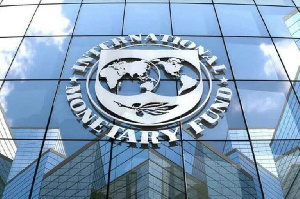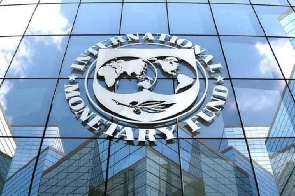Finance
IMF revises global growth rate to 3.2% in 2022

The International Monetary Fund has revised the growth rate of the global economy to 3.2 percent in 2022, 0.4 percentage point lower than in the April 2022 World Economic Outlook.
This is also far lower than the 6.1 percent Gross Domestic Product (GDP) recorded in 2021.
Already, Ghana has revised its growth rate to 3.6 percent, from the earlier 5.8 percent.
The Fund’s July 2022 Economic Outlook report attributed the slowdown in the growth rate to tightening global financial conditions associated with expectations of steeper interest rate hikes by major central banks to ease inflation pressure, and spillovers from the war in Ukraine.
Global inflation has also been revised up due to food and energy prices as well as lingering supply-demand imbalances, and is anticipated to reach 6.6 percent in advanced economies and 9.5 percent in emerging markets and developing economies this year, upward revisions of 0.9 and 0.8 percentage points, respectively.
In 2023, disinflationary monetary policy is expected to bite, with global output growing by just 2.9 percent.
The Fund further said with growth near 3 percent in 2022–23, a decline in global GDP or in global GDP per capita, sometimes associated with global recession, was not currently part of the baseline scenario.
However, there are projections for growth on a fourth-quarter-over-fourth-quarter basis point to a significant weakening of activity in the second half of 2022.
While the revisions are mostly negative for advanced economies, differing exposures to the underlying developments mean that those for emerging market and developing economies are more mixed.
CLICK HERE TO DOWNLOAD PRESS RADIO MOBILE APP

“As noted, growth revisions for major advanced economies in 2022–23 are generally negative. Baseline growth in the United States is revised down by 1.4 percentage points and 1.3 percentage points in 2022 and 2023, respectively, reflecting weaker-than-expected growth in the first two quarters of 2022, with significantly less momentum in private consumption, in part reflecting the erosion of household purchasing power and the expected impact of a steeper tightening in monetary policy,” it said.
Source: ghanaiantimes.com.gh
-

 Lifestyle4 weeks ago
Lifestyle4 weeks agoRoad Safety Authority narrates how buttocks causes road accident
-

 GENERAL NEWS1 month ago
GENERAL NEWS1 month agoWhy 15 police officers stormed Owusu Bempah’s church – Kumchacha narrates
-

 GENERAL NEWS4 weeks ago
GENERAL NEWS4 weeks agoWatch how Ibrahim Mahama rode Honda superbike to pay last respects to late friend
-

 GENERAL NEWS1 month ago
GENERAL NEWS1 month agoHow Offinso residents storm destooled queen mother’s house, demand for new chief
-

 South Africa News1 month ago
South Africa News1 month agoWoman thrown out of a speeding taxi while on her way to work
-

 GENERAL NEWS2 weeks ago
GENERAL NEWS2 weeks agoDeadly clash between youth and navy personnel results in two deaths at Tema Manhean
-

 SHOWBIZ KONKONSAH2 weeks ago
SHOWBIZ KONKONSAH2 weeks agoJunior Pope’s Death: Video of John Dumelo refusing to join canoe for movie shoot over safety concerns resurfaces
-

 News Africa2 months ago
News Africa2 months ago‘Satanically dubious’ – SCOAN releases statement on BBC’s report about TB Joshua, church






